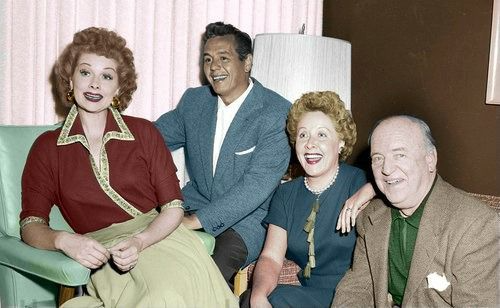
When I Love Lucy first aired on October 15, 1951, it quickly became much more than just a popular television sitcom — it revolutionized the entertainment industry and set the blueprint for all sitcoms that followed. Starring the legendary Lucille Ball alongside her real-life husband Desi Arnaz, I Love Lucy combined brilliant comedy, innovative production techniques, and groundbreaking business decisions to change the face of television forever.
A New Kind of Comedy
At its core, I Love Lucy was a simple yet brilliantly executed comedy about the misadventures of Lucy Ricardo, a spirited housewife with big dreams, and her husband Ricky, a Cuban bandleader. What made the show stand out was not just its humor but Lucille Ball’s unmatched physical comedy and timing. Her ability to create laughter with expressive facial gestures, slapstick antics, and perfect timing captured viewers’ hearts and set a new standard for television comedians.
The relatable domestic setting and the charming chemistry between Lucille Ball and Desi Arnaz allowed audiences across America to see themselves reflected in the show’s humor and warmth. This blend of authenticity and comedy helped I Love Lucy dominate ratings and win critical acclaim.
Pioneering Production Techniques
One of the biggest innovations I Love Lucy introduced was the use of the multi-camera setup in front of a live studio audience. Before this, most shows were filmed with a single camera, limiting the spontaneity and natural feel of performances. The multi-camera technique allowed for multiple angles to be captured simultaneously, making editing more seamless and preserving the energy of live performances.
This filming approach not only enhanced the viewing experience but also became the industry standard for sitcom production worldwide, used by countless shows from Friends to The Big Bang Theory.
Breaking New Ground in Television Business
Lucille Ball and Desi Arnaz weren’t just stars; they were also savvy business pioneers. Together, they founded Desilu Productions, which produced I Love Lucy. This was a bold move at the time because it gave them creative and financial control over the show, a rarity for actors then.
Desilu Productions went on to produce other landmark series like Star Trek and Mission: Impossible, cementing its place in TV history. Ball’s role as a female studio executive also shattered gender norms in a male-dominated industry, making her one of the first women to lead a major Hollywood production company.
A Lasting Legacy
Though I Love Lucy originally ran for six seasons, its impact has lasted for decades. Reruns introduced new generations to Lucy’s hilarious antics, and the show’s influence can be seen in the structure, style, and humor of nearly every sitcom since.
Moreover, I Love Lucy demonstrated that television could be both immensely entertaining and artistically innovative. It combined relatable storytelling with technical innovation and empowered performers to take control of their work, setting a precedent still followed today.
Conclusion
More than 70 years after it first aired, I Love Lucy remains a beloved classic and a pillar of television history. Its blend of comedy, pioneering production techniques, and groundbreaking business model forever changed the entertainment landscape and continues to inspire creators and audiences alike.
For anyone interested in the evolution of television, I Love Lucy is not just a show—it’s a cultural milestone.
